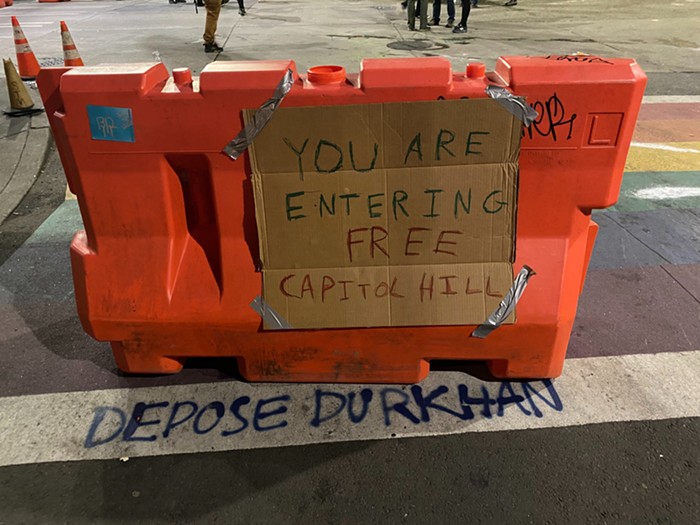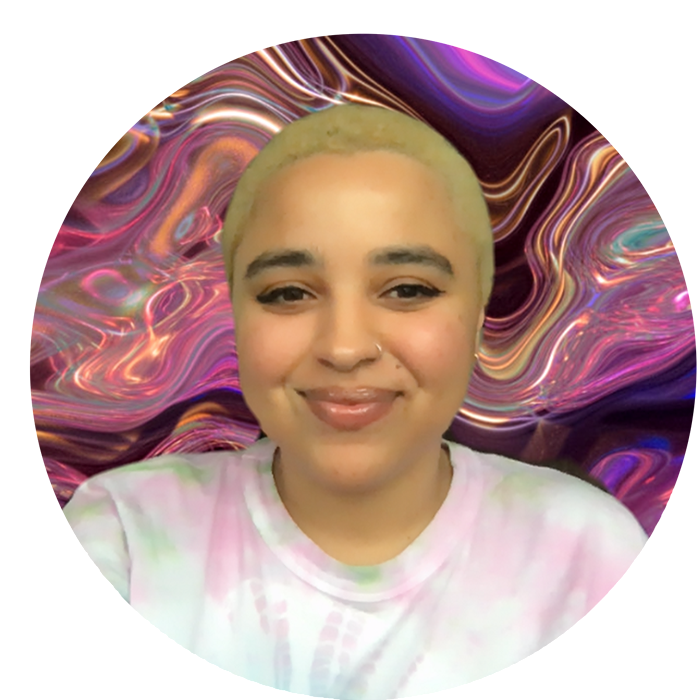
The day after the Seattle Police Department deployed tear gas, OC grenades, and blast balls in their most aggressive and sustained response to protests against police brutality on Capitol Hill, the cops cleared the path to the East Precinct and essentially let the protesters police themselves.
The slightly annoying trumpet-guy sounded a note of victory as some of the crowd triumphantly marched up the block of battered roadway that had served as the site of intense conflict for ten days, a site where a man had driven into a crowd, shot a protester, and then turned himself into police without incident.
For several minutes, others in the crowd moseyed around in the intersection, wondering what to do next. Suspicion understandably reigned. Why did the cops decide to pack up their shit and abandon their post? Were they trying to set up the protesters, expecting them to burn the place down to prove a point?
Mayor Jenny Durkan didn't help matters by tweeting out an explanation for the police retreat five hours after the fact:
In addition, @SeattleFire has several vehicles stationed near the Precinct to ensure emerging medical needs and fires are addressed if necessary. Keeping this area safe is critical, as there are approximately 500 residential homes in this block.
— Mayor Jenny Durkan (@MayorJenny) June 9, 2020
A mile north, the National Guard and police officers posted up in Volunteer Park.
The protesters, left to their own devices, became their own security force, their own informal news network, their own high-drama city council, and their own healers.
Organizers first gathered people to the center of the intersection on 12th and Pine and encouraged the crowd to keep the peace. They warned the group of rumors of Proud Boys planning to burn down the precinct and then blame protesters, and vowed not to give the cops any excuse to don riot gear again. "They gave us this precinct, and we’re not going to destroy this motherfucker,” one speaker said.
They drained water from water barriers and set up a perimeter one block in every direction from the station. Bicycle fencing, cement blocks, and cars formed street barricades. On 11th and Pine, a cardboard sign duct-taped to a barrier read, "You Are Entering Free Capitol Hill."
As the night progressed, rumors of armed Proud Boys and white supremacists continued to dominate conversations. Groups remained vigilant, with warnings given by people speaking on a sound system set up outside the East Precinct.
At one point, a small group of demonstrators appeared to kick out Q13 reporter Brandi Kruse and her team, with some calling the Fox affiliate “Fox News,” and others claiming they were reporting fake news. Some called Kruse “Karen” (more on the Karen meme here) followed up by “we’re not violent, we’re peaceful.” It was less of an expulsion and more of a suspension, as the team made its way back to the area and ended up taking shelter in the fire station on Pine and 13th, according to journalist Elizabeth Turnbull, who caught the incident on Twitter.
Around 10:30 pm, Councilmember Kshama Sawant showed up to speak in front of a crowd of a couple hundred. After calling their advancement up to the precinct a “victory” and asking for demonstrators to join her for a public meeting tomorrow in Cal Anderson, she said that her office plans to introduce legislation to defund the police by 50 percent.
It was here that the conversation began to quickly unspool. The emcees—mostly Black men—began to take issue with Sawant’s politicking, saying that 50 percent isn’t 100 percent, pressing her about “what side she’s on.” Sawant said that she couldn’t provide a one-word answer for how to abolish police within a capitalist society, and argued that anyone who said they could was bullshitting.
All nuance to the conversation was lost when a speaker mocked Sawant’s accent while talking over her, eliciting boos from the audience and calls for him to be taken off the mic.
A lot of confusion and mic-hogging followed. After more than a week of police violence and 10-word chants, it seemed the capacity for difficult and detail-oriented conversations was shot, though the need for a plan of action felt ever more urgent.
Rain started falling at midnight. The threat of menacing Proud Boys had not materialized on the ground, though the Puget Sound John Brown Gun Club showed up ready to defend, armed with guns and marshmallows for s'mores.
Sage burned on all corners of the new neighborhood—at the improvised barriers, in the crowds, and onstage with the Marshall Law Band. It was a welcome fragrance after a weekend of tear gas. People paid their respects at the vigil for George Floyd and engaged in the hard work of imagining a police-free community.
Our small, mighty, and local team is working hard to bring you coverage from Seattle's ongoing protests and policy discussions in response to the killing of George Floyd. If you are able, please consider supporting our work.





















